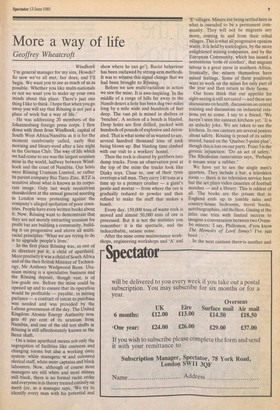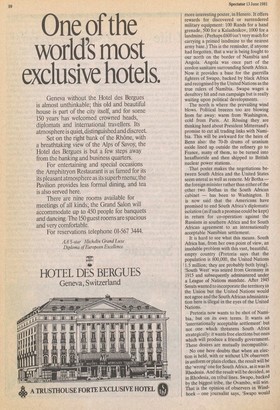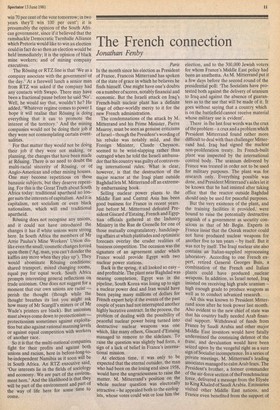More a way of life
Geoffrey Wheatcroft
Windhoek 'I'm general manager for my sins, Howdo? So now we've all met, fair does, and I'll begin. We want you to see as much of us as possible. Whether you like multi-nationals or not we want you to make up your own minds about this place. There's just one thing I like to think. I hope that when you go away you will say that %%sing is not just a place of work but a way of life.'
He was addressing 20 members of the Johannesburg foreign press corps. I flew down with them from Windhoek, capital of South West Africa/Namibia as it is for the moment cumbrously called, early that morning and bleary-eyed after a late night in the German Club. The way of life which we had come to see was the largest uranium mine in the world, halfway between Windhoek and the coast of Namibia. Our hosts were ROssing Uranium Limited, or rather its parent company Rio Tinto Zinc. RTZ is sensitive about what is known as its corporate image. Only last week recalcitrant shareholders at the annual general meeting in London were protesting against the company's alleged spoliation of poor countries. People have even written books about it. Now, ROssing want to demonstrate that they are not merely extracting uranium for profit but are building a community, building it on progressive and above all multiracial principles: 'What we are trying to do is to upgrade people's lives.'
In the first place Rossing was, as one of its directors put it, a child of apartheid. More precisely it was a child of South Africa and of the then British Minister of Technology, Mr Anthony Wedgwood Berm. Uranium mining is a speculative business and the Missing deposit, though vast, is of low-grade ore. Before the mine could be opened up and to ensure that its operation would be profitable — payable, in mining parlance — a contract of intent to purchase was needed and was provided by the Labour government of the day. The United Kingdom Atomic Energy Authority now gets 40 per cent of its uranium from Namibia, and one of the old test shafts at ROssing is still affectionately known as the Benn shaft.
On a mine apartheid means not only the segregation of facilities like canteens and changing rooms but also a working caste system: white managettv it and coloured clerical staff, white mine captains and black labourers. Now, although of course most managers are still white and most miners still black, there is no formal racist order and everyone is in theory treated entirely on merit (or, as a manager says, 'We try to identify every man with his potential and show where he can go'). Racist behaviour has been outlawed by strong-arm methods. It was to witness this signal change that we had been brought to ROssing.
Before we saw multi-racialism in action we saw the mine. It is awe-insiiiiing.lin the middle of a range of hills far away in the Namib desert a hole has been dug two miles long by a mile wide and hundreds of feet deep. The vast pit is mined in shelves or 'benches'. A section of a bench is blasted. Deep holes are first drilled, packed with hundreds of pounds of explosive and detonated. That is what some of us wanted to see, several hundred thousand tons of rock being blown up. But blasting time clashed with our visit to a workers' hostel.
Then the rock is cleared by grabbers into dump trucks. From an observation post at the top of the mine the trucks look like Dinky toys. Close to, one of their tyres overtops a tall man. They carry 140 tons at a time up to a primary crusher — a giant's pestle and mortar — from where the ore is gradually reduced to powder and then refined to make the stuff that makes a bomb.
Every day, 150,000 tons of waste rock is moved and almost 50,000 tons of ore is processed. But it is not the statistics you remember: it is the spectacle, and the indescribable, satanic noise. After the mine come maintenance workshops, engineering workshops and 'A' and 'E' villages. Miners are being settled here in what is intended to be a permanent community. They will not be migrants any more, coming to and from their tribal villages. This is what all progressive opinion wants. It is held by sociologists, by the more enlightened mining companies, and by the European Community, which has issued a sententious 'code of conduct', that migrant labour is a great curse in southern Africa. Ironically, the miners themselves have mixed feelings. Some of them positively want to work on the mines for only part of the year and then return to their farms.
Our hosts think that our appetite for sight-seeing is still not sated — and there are discussions on health, discussions on central training and discussions on industrial relations yet to come. I say to a friend, 'We haven't seen the canteen kitchens yet.' It is an unlucky joke. We are taken to see the kitchens. In one canteen are several posters about safety. Reissing is proud of its safety record, based on the 'Quebec 5-point plan', though this is lost on our party. Point 3 is the gnomic injunction: 'Do an act of safety.' The Rhodesian cameraman says, 'Perhaps it means wear a rubber.'
We have yet to see the single men's quarters. They include a bar, a television room — there is no television service here but the set plays video cassettes of football matches — and a library. This is oddest of all. The books are the jetsam that in England ends up in jumble sales and country-house bedrooms, travel books, autobiographies, old thrillers. Gazing at the titles one tries with limited success to imagine a conversation between two Ovambo miners: 'I say, Phillomon, d'you know The Memoirs of Lord lsmay? I've just been . .
In the next canteen there' is another and more interesting poster, in Herero. It offers rewards for discovered or surrendered military equipment: 100 Rands for a hand grenade, 500 for a Kalashnikov, 1000 for a landmine. (Perhaps £600 isn't very much for carrying a primed landmine to the nearest army base.) This is the reminder, if anyone had forgotten, that a war is being fought to our north on the border of Namibia and Angola. Angola was once part of the cordon sanitaire surrounding South Africa. Now it provides a base for the guerrilla fighters of Swapo, backed by black Africa and recognised by the United Nations as the true rulers of Namibia. Swapo wages a desultory hit and run campaign but is really waiting upon political developments.
The • north is where the prevailing wind blows. Political breezes too are blowing from far away: warm from Washington, cold from Paris. At ROssing they are thinking hard about President Mitterrand's promise to cut all trading links with Namibia. This will be awkward for the heirs of Benn also: the 70-lb drums of uranium oxide lined up outside the refinery go to France, many of them, to be turned into hexafluoride and then shipped to British nuclear power stations.
That poster makes the negotiations between South Africa and the United States seem unreal as well as remote. Mr Botha — the foreign minister rather than either of the other two Bothas in the South African 'cabinet — has been to Washington. It is now said that the Americans have promised to end South Africa's diplomatic isolation (as if such a promise could be kept) in return for co-operation against the Russians in southern Africa and for South African agreement to an internationally acceptable Namibian settlement.
It is hard to see what this means. South Africa has, from her own point of view, an insoluble problem with this vast, beautiful, empty country (Pretoria says that the population is 800,000, the United Nations 11.5 million; they are probably both lying). 'South West' was seized from Germany in 1915 and subsequently administered under a League of Nations mandate. After 1945 Smuts wanted to incorporate the territory in the Union but the United Nations would not agree and the South African administration here is illegal in the eyes of the United Nations.
Pretoria now wants to be shot of Namibia, but on its own terms. It wants an 'internationally acceptable settlement' but not one which threatens South Africa strategically: it wants free elections but ones which will produce a friendly government.
These desires are mutually incompatible. No one here doubts that when an election is held, with or without UN observers in uniform or plainclothes, the result will be the 'wrong' one for South Africa, as it was in Rhodesia. And the result will be decided, as in Rhodesia, on tribal lines. Swapo, backed by the biggest tribe, the Ovambo, will win. That is the opinion of observers in Windhoek – one journalist says, 'Swapo would years they'll win 100 per cent'; it is presumably the opinion of the South African government, since if it believed that the ramshackle Democratic Turnhalle Alliance which Pretoria would like to win an election could in fact do so then an election would be held immediately; it is the opinion of black mine workers; and of mining company executives.
The }tossing or RTZ line is that 'We as a company associate with the government of the day.' At a farewell lunch a senior man from RTZ was asked if the company had any contacts with Swapo. There may have been a fractional pause before he said 'No'. Well, he would say that, wouldn't he? He added, 'Whatever regime comes to power I hope it will realise that Rossing is doing everything that It can to promote the interest of the territory.' And the mining companies would not be doing their job if they were not contemplating certain eventualities.
For that matter they would not be doing their job if they were not making, or planning, the changes that have been made at }tossing. There is no need to doubt the multi-racial sincerity of ROssing, or of Anglo-American and other mining houses. One may become repetitious on these banausic subjects, but they deserve repeating. For this is the Great Truth about South Africa today: traditional apartheid no longer suits the interests of capitalism. And it is capitalism, not socialism or even black nationalism, which will end traditional apartheid.
ROssing does not recognise any unions, and it could not have introduced the changes it has if white unions were strong here. In South Africa the members of Mr Arrie Paulus's Mine Workers' Union dislike even the small; cosmetic changes forced upon them (`Ag, man, you can't donder the kaffirs any more when they play up'). They would abominate ROssing conditions: shared transport, mixed changing rooms, equal pay for equal work. South Africa prompts interesting general reflections on trade unionism. One does not suggest for a moment that our own unions are racist — perish the thought (though while the thought breathes its last you might ask how many of Mr Scargill's miners or of Mr Wade's printers are black). But unionism must always come down to protectionism. — protectionism sometimes against exploitation but also against rational manning levels or against equal competition with workers of another race.
So it is that the multi-national companies fight for their profits and against both unions and racism, here in before-long-tobe-independent Namibia as it soon will be iri South Africa. An RTZ executive said, `Our interests lie in the fields of sociology and economy. We are part of the environment here.' And the likelihood is that they will be part of the environment and part of the way of life here for some time to come.








































 Previous page
Previous page